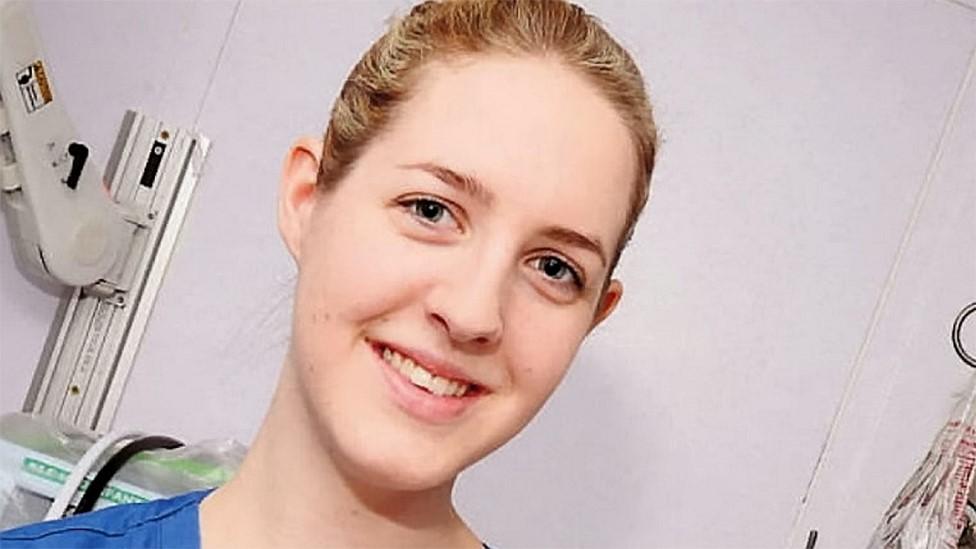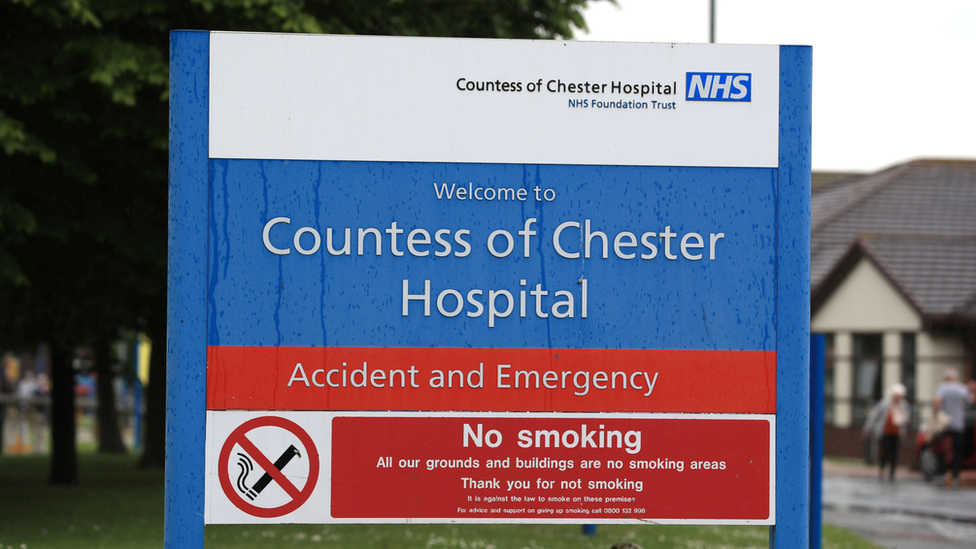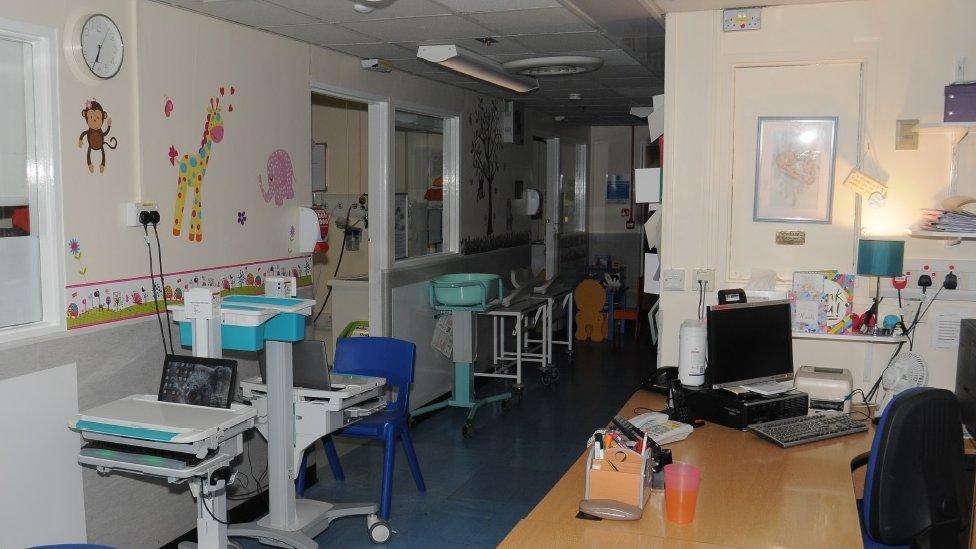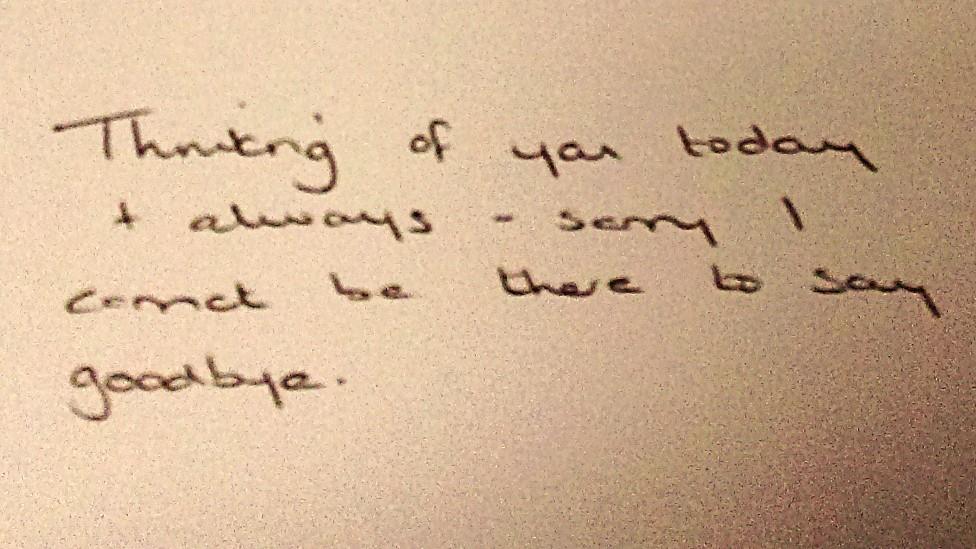Lucy Letby: Baby's seizures did not happen naturally, trial hears
- Published

Lucy Letby is accused of murdering seven babies and trying to kill 10 others
Two seizures suffered by a baby girl did not happen naturally, nurse Lucy Letby's murder trial has heard.
The 33-year-old is accused of attempting to murder the premature-born infant in her cot at the Countess of Chester Hospital's neonatal unit.
Consultant paediatrician Dr John Gibbs told her trial tests showed no signs of infection and did not identify a cause for Child J's seizures.
Ms Letby, originally of Hereford, denies all the charges against her.
She is accused of murdering seven babies and attempting to murder 10 others between June 2015 and June 2016.
On Monday Manchester Crown Court heard Child J had two "profound" drops in blood oxygen levels at about 05:00 GMT on 27 November 2015.
Two further episodes took place two hours later, the court was told, when her heart rate also plunged and she showed signs of a seizure.
Dr Gibbs said her limbs stiffened on the latter two occasions and her hands were "clenched".
He said the first fit was "reasonably long" and took 10 minutes to settle, while the second stopped after "three or four minutes".

The babies were being cared for on the neonatal ward at Countess of Chester Hospital
Giving evidence earlier, expert medical witness Dr Dewi Evans told prosecutor Nick Johnson KC: "The first pair of collapses were unexpected because she was nice and stable before that.
"The second pair of events were more serious and required more in the way of resuscitation, but again were unexpected and I noted the markers for inflammation were normal which tended to rule out infection.
"The second pair coincided with what the doctors describe as a seizure or a fit. This is indicative of something going wrong with the brain.
"My opinion was that [Child J's] brain was deprived of oxygen for a sufficient level of time to cause hypoxia, i.e loss of oxygen to the brain causing fits.
"As far as I know this was the only occasion when she had seizures and the cause of this was the hypoxia, the lack of oxygen to the brain."
Mr Johnson asked the retired consultant paediatrician: "So far as the hypoxic incidents that had caused these seizures were concerned, could you identify any natural process that might have caused that?"
Dr Evans replied: "No, I could not. There was no reason why she suddenly became hypoxic."
Mr Johnson went on: "If infection had been the cause of her rapid decline would she have recovered as quickly as she did?"
Dr Evans said: "I don't think she would. Babies who develop an infection usually recover over a period of days."

A picture inside the neonatal ward at the Countess of Chester Hospital was shown to the jury
Dr Evans agreed with Ben Myers KC, defending, that he could not rule out infection "for sure".
However fellow expert witness, consultant paediatrician Dr Sandie Bohin, said she had excluded infection.
She told the court: "[Child J] was a well baby. She was ready to go home. Babies who are ready to go home do not have major desaturations which lead to prolonged resuscitation.
"These were completely unexpected and she required the Neopuff [face mask] ventilation for a long time before she came round and was well again.
"I thought that seemed extremely unusual - the speed of the collapse, the longevity of the resuscitations and the fact that she seemed to recover quite quickly.
"That is not the way that infection normally plays out."
Collapses
Dr Bohin noted that Child J was clinically well and back to her normal self before she even received antibiotics.
She told Mr Myers she had not been able to identify an "obvious cause" for her collapses.
Child J had previously undergone bowel surgery a day after her birth but medics have said she was stable in the weeks that followed.
On the morning of 27 November she was being cared for in nursery room 4 in readiness for returning home to her parents.
Child J was later moved to room 2 for closer monitoring ahead of the second pair of collapses.
She eventually was discharged in January 2016 and was described as progressing "very well" at her final outpatient clinic more than a year later.
The trial continues.

Why not follow BBC North West on Facebook, external, Twitter, external and Instagram, external? You can also send story ideas to northwest.newsonline@bbc.co.uk, external
Related topics
- Published13 February 2023

- Published10 February 2023

- Published10 February 2023

- Published9 February 2023

- Published2 February 2023

- Published1 February 2023
